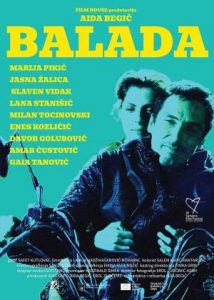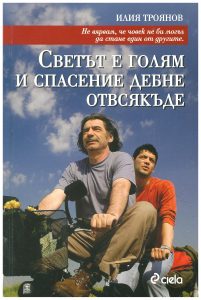Bosnië & Herzegovina 2022, Aida Begić 
Balada is een moderne interpretatie van het “perfecte vrouwbeeld” dat in veel Zuidslavische folklore ballades naar voren komt. In die ballades schikten vrouwen zich vaak aan hun tragische lot, in deze film, echter, gaat Begić op zoek naar moderne vrouwelijke liefde, vrijheid en identiteit.
Het hoofdpersonage van de film, Merjem-Meri, is een dertigjarige huisvrouw en moeder van de achtjarige Mila. Ze verhuist na een huwelijk van tien jaar weer naar haar ouderlijke huis. Meri ontdekt er snel dat ze er verstrikt raakt in een web van provinciale regels, verwachtingen en een complexe relatie met haar ambitieuze moeder en haar verwende jongere broer. In een poging om zichzelf opnieuw te leren kennen, waagt ze zich aan een auditie voor een film die in haar buurt zal opgenomen worden.
(Rusland) / Zweden / Noorwegen / Frankrijk / Duitsland 2022, Marusja Syroečkovskaja
Vorig jaar nog op Film Fest Gent, dit jaar in onze intieme filmreeks.
In deze aangrijpende documentaire toont Syroečkovskaja hoe haar geliefde Kimi ten onder gaat aan drugs. Ze puzzelt hiervoor honderden uren beeldmateriaal samen die ze gedurende twaalf jaar (sinds haar zestiende) van haar leven heeft gemaakt. De film is tegelijk een weerspiegeling van het leven voor jongeren in Rusland: ze toont de inertie van de generatie millenials die zich machteloos voelt tegenover de toenemende politieke repressie onder Vladimir Poetin.
De documentaire viel in de prijzen tijdens het Bilbao International Festival of Documentary and Short Films, Buenos Aires International Festival of Independent Cinema, Ghent Film Festival en Singapore International Film Festival.
Onlangs verscheen in Raam op Rusland een interview met de regisseur: https://www.raamoprusland.nl/dossiers/cultuur/2447-portret-van-een-depressieve-generatie
Bulgarije 2008, Stefan Komandarev
De film begint in 1970, wanneer Alex (Saško) wordt geboren in een klein Bulgaars stadje. Zijn familie emigreert al snel naar het Westen, meer bepaald naar Duitsland. 25 jaar later slaat het noodlot toe. Door een zwaar auto-ongeluk verliest Saško zijn ouders en lijdt hij zelf aan geheugenverlies. Saško’s grootvader, de legendarische (of beruchte?) Bai Dan, komt naar Duitsland om hem te helpen. Bai Dan leert zijn kleinzoon backgammon spelen en neemt hem mee met een reis per tandem naar Bulgarije. Zo krijgt Saško uiteindelijk niet alleen zijn geheugen, maar ook zijn zin om te leven terug.
Светът е голям… is ondertussen uitgegroeid tot een cultfilm en kreeg vele onderscheidingen, zowel in Bulgarije als daarbuiten. Zo mag de film prijzen vanop de internationale filmfestivals in Bergen, Warschau, Zürich, Almaty, Vilnius, Minsk, Taipei, enz. op zijn palmares zetten.
Slovenië 2018, Miha Mazzini & Dusan Joksimovic
Izbrisana (Erased) is een film van Miha Mazzini gebaseerd op zijn gelijknamige boek.
We volgen Ana, een jonge moeder die net bevallen is in het lokale ziekenhuis. Alles is in orde, maar er blijkt een klein probleem te zijn met haar papierwerk: haar dossier is niet te vinden in de computer. Eerst denkt het personeel dat het om een tijdelijk dataprobleem gaat door slechtwerkende software. Heel snel, echter, blijkt er meer aan de hand te zijn. Ana raakt steeds meer verward in een web van bureaucratie dat Kafkaiaanse proporties aanneemt. Doordat ze geen dossier heeft, heeft ze geen recht op sociale zekerheid, een permanent adres, en zelfs geen recht op haar kind. Ze wordt brutaal gedwongen om haar pasgeboren dochter achter te laten totdat alles opgelost is.
Uiteindelijk blijkt dat Ana niet ingeschreven is in het bevolkingsregister en dus als buitenlander wordt beschouwd, ook al heeft ze haar hele leven in Slovenië doorgebracht. Legaal bestaat ze eigenlijk niet, waardoor haar kind als wees wordt geregistreerd en op een lijst voor adoptie terechtkomt. De film gaat met dit verhaal in (op de gevolgen) van een donkere bladzijde uit de Sloveense geschiedenis. In 1991, na de Sloveense onafhankelijkheidsverklaring, heeft de overheid immers 2% van de bevolking uit het bevolkingsregister geschrapt.
De film is uitgebreid gelauwerd en viel onder meer in de prijzen tijdens het FEST International Film Festival (2019), het Pula Film Festival (2019) en het Slovene Film Festival (2018).
Florian Wandl (University of Zürich)
Abstract
Research on the system of pronominal clitics so far has mostly focused on the major Slavic languages. Studies addressing issues regarding these clitics in minor Slavic languages or dialects are rare. In this talk, I will discuss the system of pronominal clitics in the Slovenian dialect spoken in in the Resia valley in the Friuli-Venezia Giulia region of northern Italy. This dialect has been in intense language contact with Romance (mostly Friulian and standard Italian) for several centuries which has left an imprint also on pronominal clitics. After having introduced the inventory of pronominal clitics in Resian, the place of these clitics in the clause is established. The emerging system of Resian pronominal clitics is then discussed against the background of Slavic and Romance clitic systems.
Biografie
Florian Wandl is a postdoctoral researcher at the Department of Slavic Languages and Literatures at the University of Zürich. He has a background in historical linguistics and philology, and is also interested in linguistic typology. His main research focus boils down to the question of how the Slavic languages came to be the way they are.
Oleksandr Zabirko (Regensburg University)
Abstract
Since the outbreak of the war in Donbas in 2014, this border region has garnered global attention both in news coverage and on the battlefield. This spotlight has brought a wide array of issues concerning the Donbas’s place on the cultural maps of Ukraine and Russia, which are ranging from the region’s entangled history to the complex relations between regional and national identity within its borders. The image of the Donbas as a contested, unsettled region has gained even more significance with the escalation of the Russian-Ukrainian war in February 2022.
In my presentation, I will delve into the construction of the Donbas’s image in culture, literature, and cinema since the early 20th century, tracing its evolution and the narratives it has generated over time. However, my primary objective is to examine the Donbas within the context of the ongoing Russian-Ukrainian war. In this conflict, the region serves as both a Russian casus belli and a central element of contemporary Russian imperial imagery, where the Donbas plays a prominent role as the heartland of “Novorossiya” or “New Russia” – a territorial concept that lays claim to southeastern Ukraine as part of the Russian state. Ultimately, I will investigate the strategies employed by contemporary Ukrainian authors to counter Russian imperial claims and reimagine the Donbas as both a Ukrainian and European region.
Biografie
Oleksandr Zabirko completed his studies in Literature and Linguistics at the University of Luhansk (Ukraine) and the University of Duisburg-Essen (Germany). He earned his PhD in Slavic Literatures and Cultures from the University of Münster and is currently affiliated with the Slavic Department at the University of Regensburg. His primary research interests encompass literary models of spatial and political order, contemporary literatures from Russia and Ukraine, and fantastic literature as a whole. Notable among his recent publications are “Literary Forms of Geopolitics: The Modeling of Spatial and Political Order in Contemporary Russian and Ukrainian Literature” (in German, 2021) and “Figurations of the East” (in German, co-edited, 2022).
Otto Boele (Universiteit Leiden)
Abstract
This paper explores the figure of the dissident-writer in recent Russian cinema and TV drama, specifically the way in which these productions appropriate and (de-)construct mythologies of the shestidesiatniki (men/women of the 1960s) making them subservient to current narratives on protest and political dissent in late-Putinist Russia (post 2012). The purpose is to show that by “domesticating” some of these former dissidents or otherwise ostracized authors (while excluding others), these films and TV series reimagine the 1960s as a seemingly romantic, but essentially anomalous time in which the literary forces of the Russian heartland (Aleksandr Vampilov, Nikolai Rubtsov) were undeservedly marginalized by the noisy avant-gardists in the capitals (Akhmadulina, Yevtushnko, Voznesensky). Focusing primarily on Tainstvennaia strast’ (Furman, 2016), a Channel One production based on Vasily Aksenov’s last novel, and Oblepikhovoe leto (Alfiorov, 2018), a biopic on the career of Aleksandr Vampilov, I hope to demonstrate how one of the most liberal periods of Russia’s twentieth-century history is being cinematically exploited for the purpose of alerting the viewer about “similar” phenomena in the present (“latte-sipping hipsters” in Moscow vs. the “glubinnyi narod”, “Gayropa vs. “traditional values”etc.).
Biografie
Otto Boele obtained his MA degree in Russian at the University of Amsterdam and his PhD at the University of Groningen. He is now Associate Professor of Russian literature at the University of Leiden. He is the author of The North in Russian Romantic Literature (1996), Erotic Nihilism in Late Imperial Russia. The Case of Mikhail Artsybashev’s “Sanin” (2009) and a co-editor of Post-Soviet Nostalgia. Confronting the Empire’s Legacies (2019). Recently, he has published a number of articles on glasnost cinema and the collective memory of the 1990s.
Alexander Maxwell (Victoria University, Wellington)
Abstract
As the era of nationalism began, Slavs in the Habsburg Empire espoused Panslavism, which they imagined as a linguistic community arising because all Slavs spoke the same “Slavic language.” Efforts to promote this language, and the distinct literary traditions it encompassed, rested on the unstated assumption that a single “language” may contain multiple literary traditions, imagined as “dialectical” yet written in distinct orthographies. This paper examines this literary Panslavism as a form of nationalist politics. It suggests that literary Panslavism affected subsequent Czechoslovak and Yugoslav nationalism, both of which similarly posited a single language with multiple literary traditions.
Biografie
Alexander Maxwell is associate professor of history at Victoria University in Wellington, New Zealand. He completed his Ph.D. at the University of Wisconsin, Madison in 2003. He previously taught at the University of Wales Swansea, and the University of Nevada, Reno. He is the author of Choosing Slovakia, Patriots Against Fashion, and Everyday Nationalism in Hungary. He has published widely on nationalism theory and nationalism in East-Central Europe. He has guest edited themed issues of Nationalities Papers, Nationalism and Ethnic Politics, the Journal of Nationalism, Memory, and Language Politics, German Studies Review, and Central Europe. He is currently working on Habsburg Panslavism.
Petar Grubišić (Ghent University)
Abstract
The end of the Second World War was a catalyst for massive population transfers, which resulted in an unmixing of people on an unprecedented scale. This activity primarily targeted the numerous German populations that had settled in the border regions of Central and Eastern Europe. They were replaced with appropriate ethnic groups who were supposed to bring stability and the necessary workforce for regional development. Postwar population shifts thus combined ethnopolitical and socio-economic motives. The precise policies, practices and responses to the multiple population shifts taking place in post-war Europe, however, differed from case to case.
This talk will situate internal migration in Socialist Yugoslavia within the broader context of population transfers in Europe after the Second World War. It will particularly draw parallels with the cases of Poland (Recovered Territories) and Czechoslovakia (Former Sudetenland). The talk will discuss a number of Yugoslav particularities. It will address the interconnection of internal migration with agrarian reform, its primarily voluntary character, and how government classification of people on the move paid attention to previous political and migration processes.
Biografie
Petar Grubišić is a Ph.D. Researcher at Ghent University (Department of Languages and Cultures) since September 2021. He earned an MA in History (2013-2017) as well as an MA in Archaeology (2013-2018) at the University of Zagreb. His Ph.D. project is tentatively titled: “Internal Migration and Regional Development in Socialist Yugoslavia: Settlement from Dalmatia to Slavonia and Vojvodina Compared”. This research focuses on the state-guided colonisation from the region of Dalmatia to similarly multicultural regions of Slavonia and Vojvodina. It particularly looks into the policies of internal migration and its impact on the communities involved through a micro-historical comparative analysis of colonist settlements in Vojvodina and Slavonia.
Christian Voss (Humboldt University, Berlin)
Abstract
The lecture discusses the cultural contribution of the Albanian-speaking population in Tito’s Yugoslavia under the condition of its highly contradictory political treatment, oscillating between repression and discrimination in the periods 1944-1961 and 1981-1998, and overt promotion between 1966 and 1981. The biographies of “cultural defectors” like the poet Esad Mekuli, famous actors Behim Fehmiu and Faruk Begolli or sportsmen Fadil Vokrri clearly indicate that the riots in Kosovo in 1981 triggered the loss of Yugoslav loyalty among the Albanians. The limits of Yugoslav nation-building can also be shown in the representation of Albanians in Miroslav Krleža’s Encyclopedia of Yugoslavia, where Serbian nationalist intervention in 1981 insisted on the rewriting of the articles on Albania(ns) to reinstall the traditional hegemonic and paternalistic discourse.
Biografie
Christian Voss has been Head of the Department for South Slavic Studies at Humboldt University Berlin since 2006. He finished his PhD on Church Slavonic in 1996 and his habilitation on Slavic minorities in Greece in 2004 in Freiburg/Br. He has extensively published in the fields of sociolinguistics, contact linguistics and language policy in the Balkans. He is the founding director of the Interdisciplinary Center “Crossing Borders” in Berlin, editor of the series “Studies on Language and Culture in Central and Eastern Europe” and co-editor of several journals.



